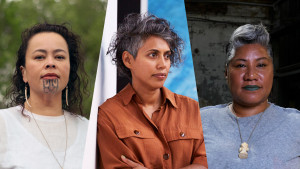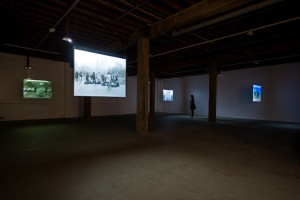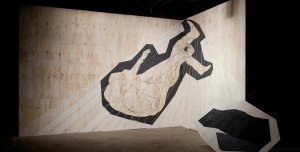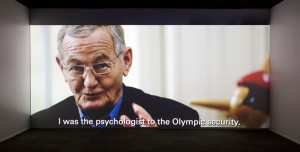Exhibition
Re-Stor(y)ing Oceania
23 Mar – 13 Oct 2024
Ocean Space, Venice

Ocean Space, Venice
Chiesa di San Lorenzo
Castello 5069
30122 Venezia
23 March 2024
Re-stor(y)ing Oceania is a new exhibition comprising two new site-specific commissions by Indigenous artists from the Pacific, Latai Taumoepeau and Elisapeta Hinemoa Heta. The exhibition is curated by Bougainville-born artist Taloi Havini, who returns to Ocean Space after her 2021 solo exhibition. Drawing together performance, sculpture, poetry, and movement, Havini’s curatorial vision is guided by an ancestral call-and-response method. Havini uses this as a means to seek solidarity and kinship in times of uncertainty. Real threats to life call for the need to slow down the clock on extraction and counter this with reverence for life of the Oceans. Opening at Ocean Space, Venice in Spring 2024, the exhibition also coincides with the 60th International Art Biennale.
The Pacific Islands are one of the regions most impacted by the damaging effects of climate change, and their Indigenous leaders and communities have led the call for more study and greater awareness of the ensuing crises for decades. Havini is joined by a curatorium, working closely together to produce public programs centering Indigenous perspectives from across Oceania, Australia, and the Asia-Pacific and its diasporas. These gatherings will provide space for exchanges and conversations, including three days of live performances held over the Venice Biennale vernissage week (April 16–20, 2024), and will remain accessible online, creating a new archive of stories and contributions by First Nations artists, curators, writers, community leaders, poets, musicians, navigators, sailors, fisherfolk and scholars, expanding on the current understandings of our oceans.
For the new commissions, Havini has invited artist Latai Taumoepeau, who uses faivā (performing art) grounded in Tongan philosophies of relational vā (space) and tā (time). Centered in the body, faivā cross-pollinates ancient and everyday temporal practices to make visible the impact of the climate crisis in the Pacific. In the artist's own words, ‘The more ancient I am, the more contemporary my work is’. The significance of song to poetically record histories and to share values and knowledge in Taumoepeau’s homeland of Tonga is acknowledged through the creation of a new choral work focused on her firm resistance to deep sea mining. The newly commissioned work, Deep Communion sung in minor (archipelaGO, THIS IS NOT A DRILL), will engage audiences in the process of giving Pacific islanders a voice on this issue.
Sculptural and interactive machines installed in Ocean Space will provide audiences with opportunities to engage with Taumoepeau’s Deep Communion sung in minor (archipelaGO THIS IS NOT A DRILL) either through activating the installation – which will trigger part of the musical score – or by taking a seat in the surrounding bleachers to witness local sports teams in performance with the work.
In response to Taumoepeau‘s new solo commission, a live project space emerges at Ocean Space that is imagined in collaboration with Wāhine architect Elisapeta Heta, a Māori, Samoan, and Tokelauan leader and advocate for change, whose work provides Maori and Pasifika perspectives on the importance of place to design and cultural identity.
Heta is affiliated to the Ngāti Wai and Waikato Tainui iwi with Samoan and Tokelauan heritage. In her response to this exhibition, Heta will present a new multi-sensory installation, The Body of Wainuiātea, embodying ritual and ceremony guided by the Māori concept of tikanga from her ancestral lands of Aotearoa New Zealand, alongside those from across the Te Moana-nui-a-kiwa. Tikanga is derived from the Māori word 'tika', which means 'right' or 'correct', so to act in accordance with tikanga is to behave in a way that is culturally proper or appropriate. Designed for exchange and collaboration, this welcoming space seeks to use ancient ways of knowing and relating through story and waiata (song) to restore a greater awareness of atua (the gods) connections to our Ocean, re-establishing the tapu (sacred) within current environmental and scientific campaigns seeking to protect the life of the planets largest bodies of water. Collaborators include Dr Albert Refiti, Hiramarie Moewaka, and Rhonda Tibble.
Across the Pacific, there is a particular way of hosting guests through storytelling. The Body of Wainuiātea by Heta provides a safe and welcoming space for re-establishing a solidarity network of artists, curators, writers, community leaders, poets, musicians, navigators, sailors, fisherfolk, scholars, scientists, lawyers, and communities. A series of conversations, performances, and actions will be programmed in this space over the opening and during 2024, inviting contributions from multi-disciplinary practitioners. Further details of the program are to be announced in early 2024.
More info on the exhibition here
Press release here





